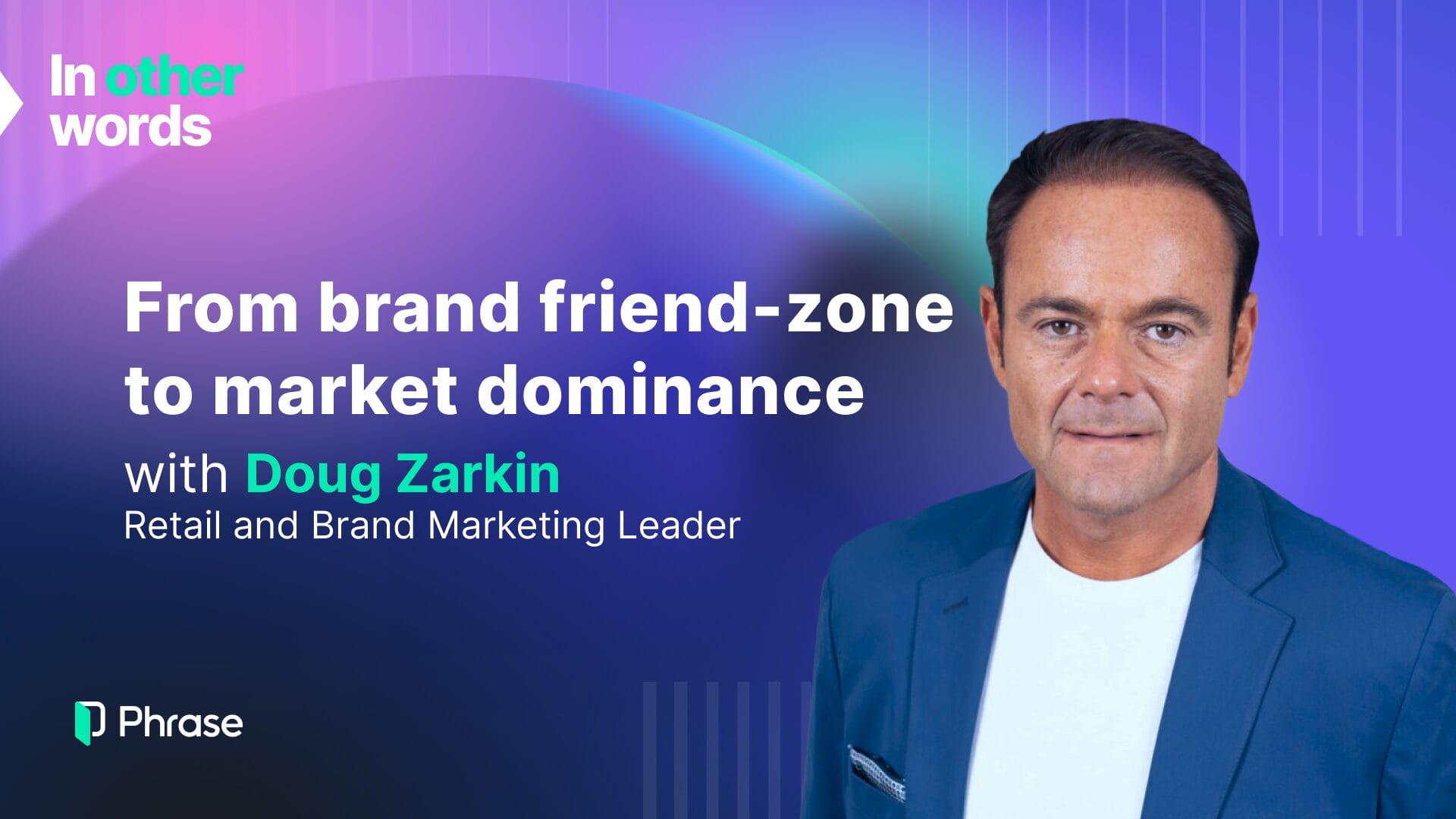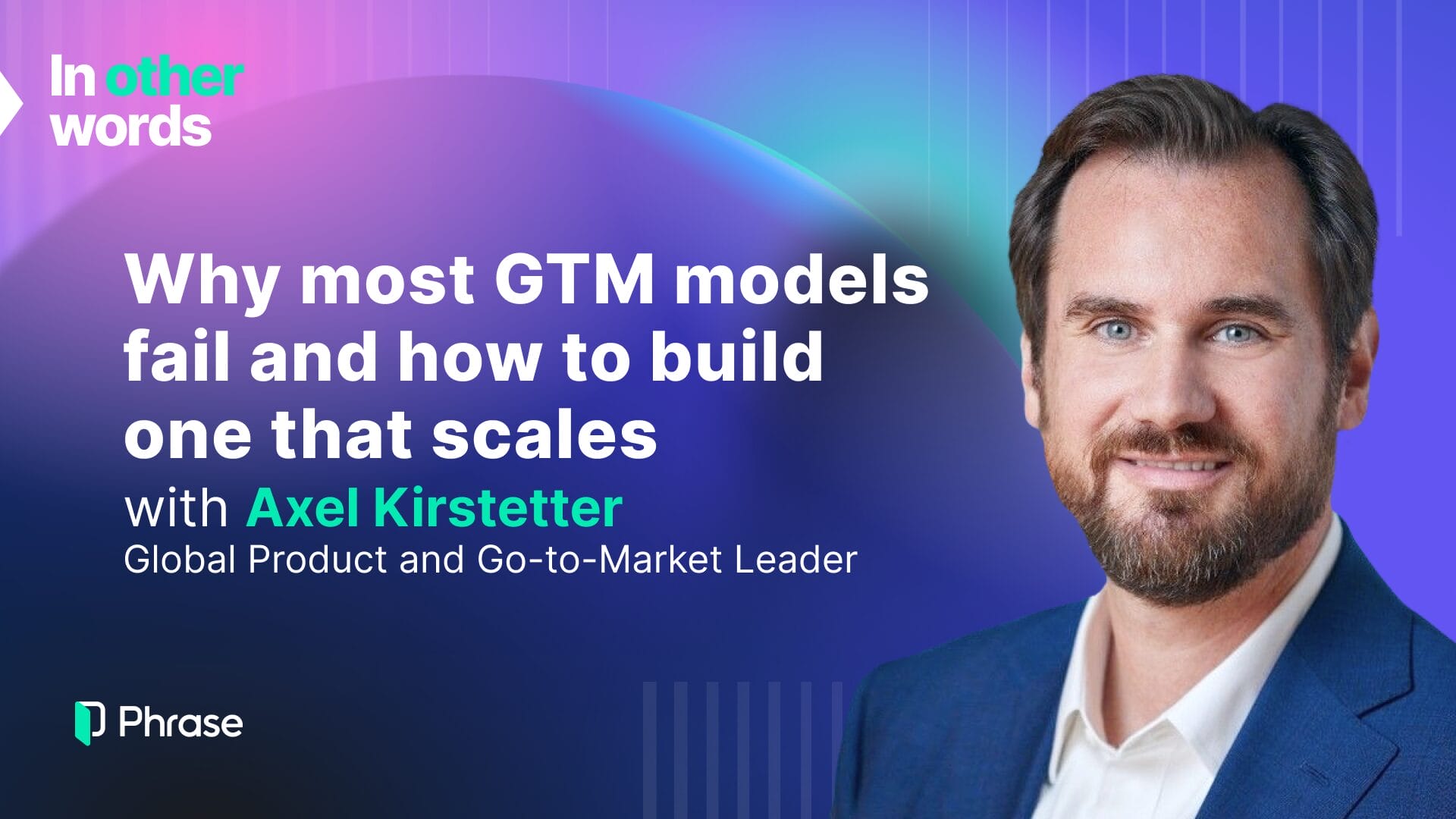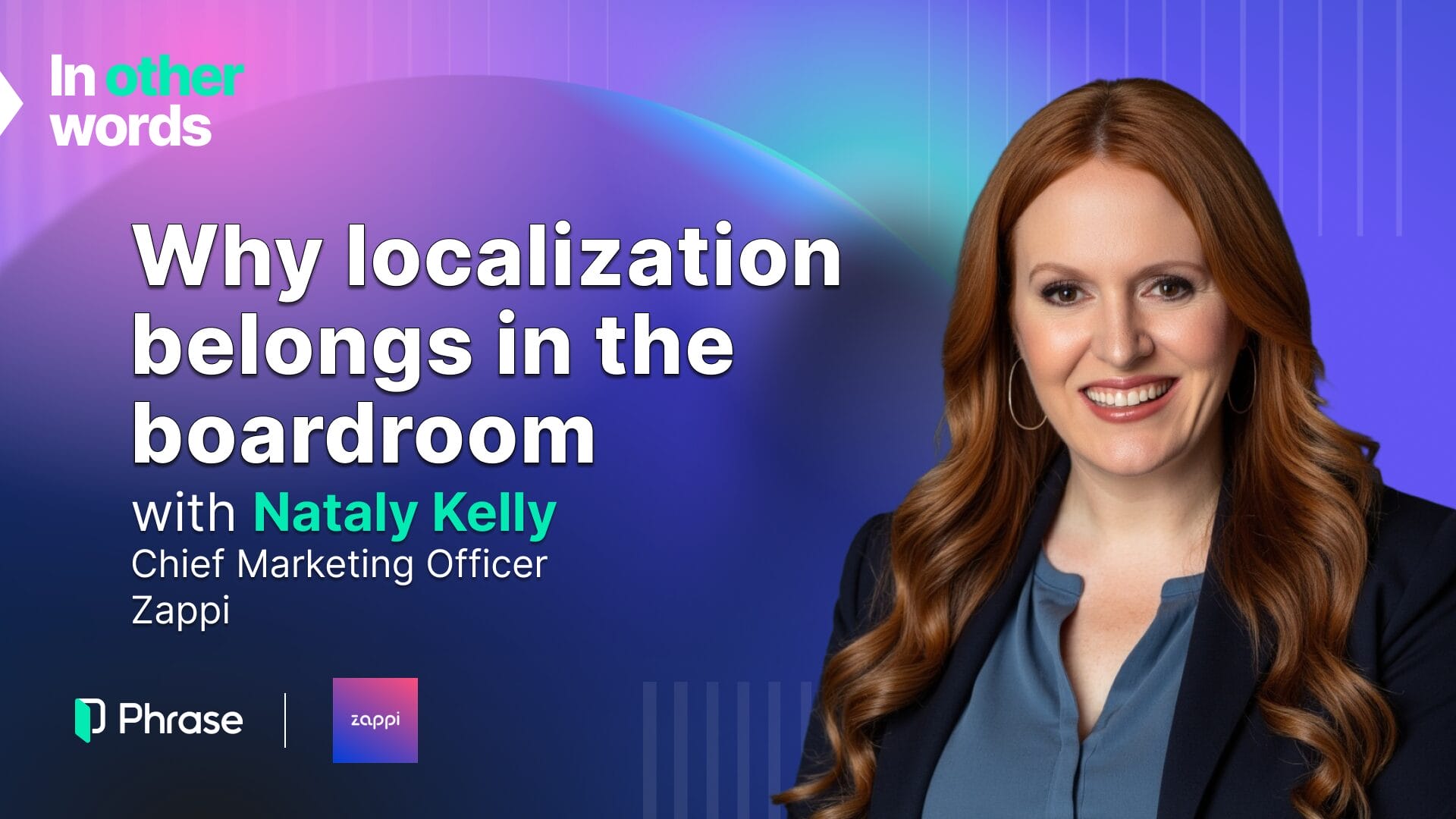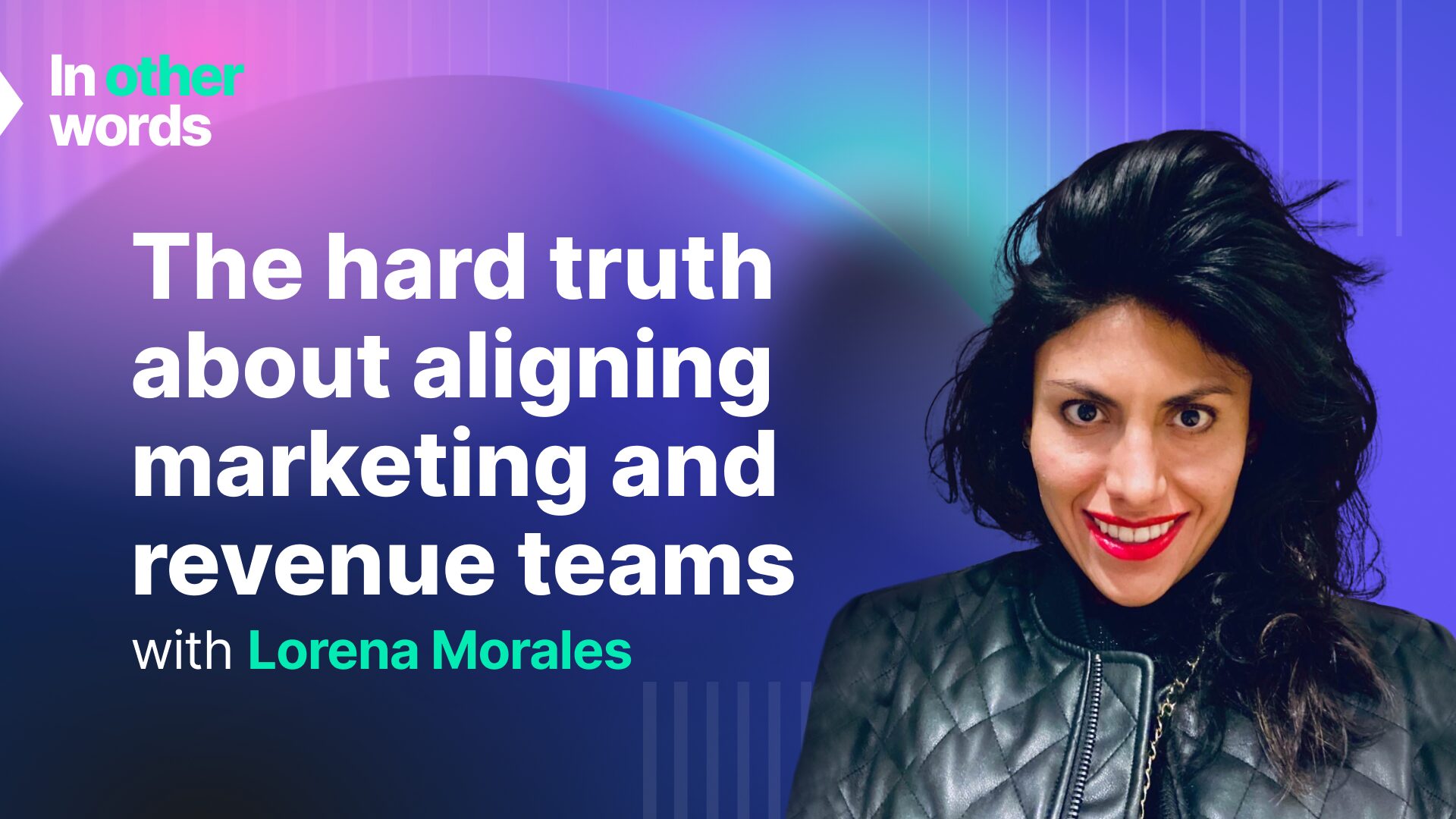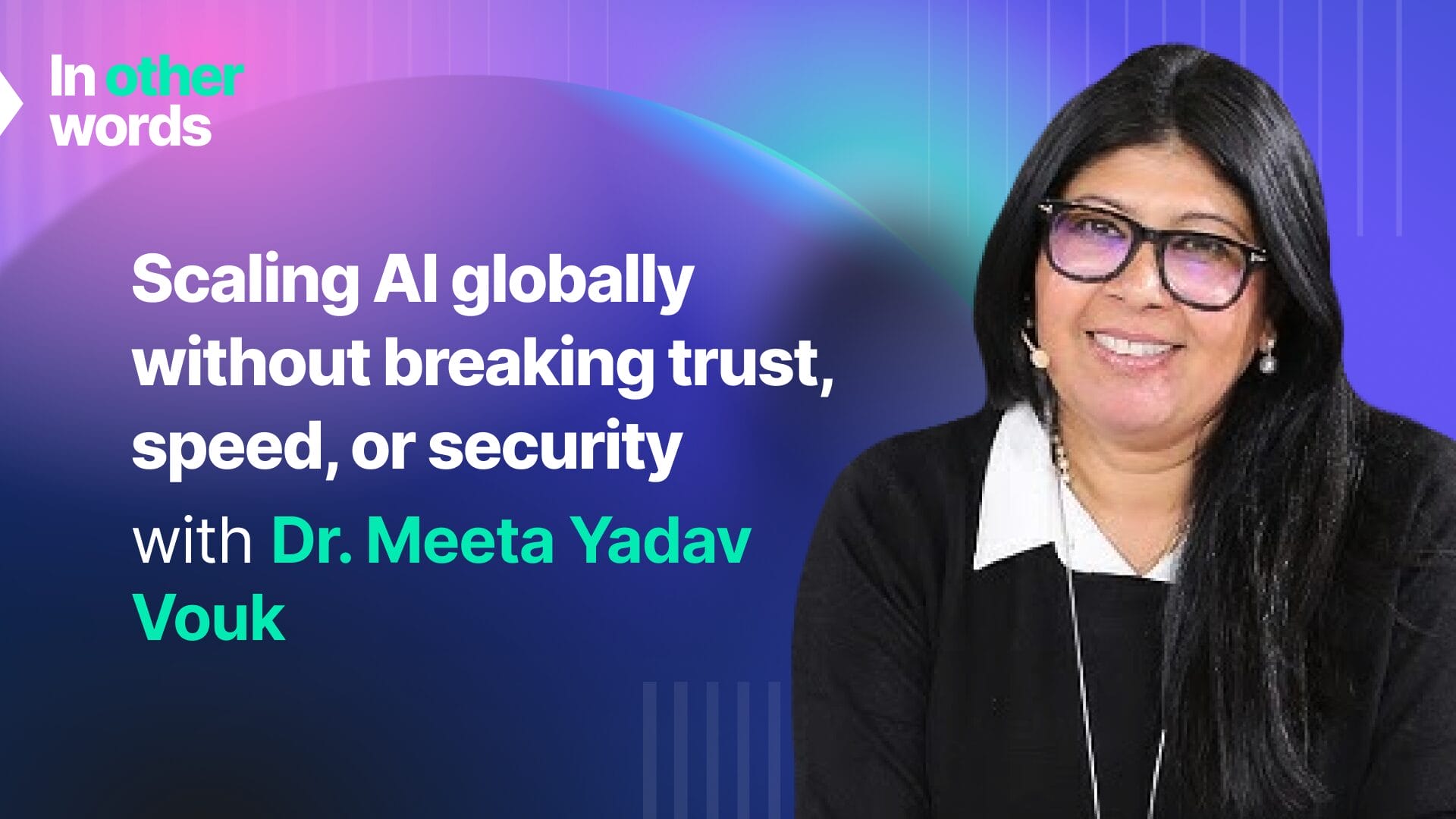Turning around a brand before it’s too late
Kevin Miller is a veteran CMO with 35+ years shaping brands like McDonald’s, Coca-Cola, PepsiCo, and Disney. He led The Fresh Market’s turnaround from the worst company to work for in America to USA Today’s ‘America’s Best Supermarket’ in a year. He joins host Jason Hemingway to explain how.


with Jason Hemingway and Kevin Miller

About our guest
Kevin Miller is a brand marketer and innovator with 30+ years leading marketing, advertising, and media for Fortune 100 companies. As former CMO of The Fresh Market, he oversaw brand positioning, multi-channel strategy, and product innovation. Previously, he served as CMO of Natural Grocers, where he drove a major marketing, culture, and digital transformation, delivering 12 straight quarters of sales and traffic growth and growing the (N)power loyalty program more than 500% to 1.3 million members.
Kevin sits on the ANA CMO Masters Circle, serves on the National Advertising Review Board, and has been recognized by USA Today as a Top 10 CMO to Watch (2024), LinkedIn as a top influential marketer (2022), and the Millennium Alliance as CMO Innovator of the Year (2021).
Episode transcript
Jason Hemingway: Welcome to In Other Words, the podcast from Phrase, where we speak with leaders who are shaping the future of marketing, customer experience, and global growth. I’m your host, Jason Hemingway, CMO at Phrase, and today I’m joined by Kevin Miller. Now Kevin’s a seasoned marketing strategist and the former Chief Marketing Officer at The Fresh Market.
Jason Hemingway: He’s got over 35 years leading marketing, advertising and media for Fortune 100 companies, and he’s driven amazing transformation in some global brands. His leadership at The Fresh Market kind of stands out as one of the most impressive turnarounds in retail history in America. So, Kevin recently was named by USA Today as one of the top CMOs to watch.
Jason Hemingway: So I’m really glad that he’s coming on the podcast. He’s continuing to influence how brands think about loyalty, personalizations, and scaling customer connections. So, I’d like to welcome Kevin to the podcast. Kevin, welcome to the podcast. How are you?
Kevin Miller: I’m doing great, Jason. Thank you.
Jason Hemingway: Well, I’m glad you could join us and fit us into your hectic schedule.
Jason Hemingway: Now, you’ve firmly retired, but we’re gonna talk a bit more about your career as it was, and what you got up to, and try and give our audience, you know, a view on some of the things that you’ve done and maybe some insights into how you sort of scale businesses and grow them globally.
Jason Hemingway: And, I think before we get into your specific experience, let’s talk a little bit about your kind of professional history. If you could just start by telling us, and we ask a lot of our guests about this, about your career journey and the key moments in that journey and kind of what it shaped you into.
Kevin Miller: So, I got into advertising after six years in the Army as an Army officer following my graduation from West Point in the mid-80s. I was fortunate to have been recruited by Leo Burnett at the time, one of the world’s top five ad agencies. And I was lucky enough to get to work on the national McDonald’s business, where I learned about, you know, learned from the best brand marketing team, the McDonald’s marketing team, and the best ad agency.
Kevin Miller: And that’s where I fell in love with marketing and advertising, and retail. You know, the importance of things like thinking like a brand, but acting like a retailer, putting the customer first, and always driving for insights and ideas and innovation in all that you do in this wonderful career of marketing and advertising.
Kevin Miller: That led to a series of senior positions, like working for Coca-Cola. I was a VP of marketing for PepsiCo, Yum! Brands – or Pizza Hut – CMO for Disney, ABC’s Radio Division, which got me into entertainment and media. And eventually became the CMO for Natural Grocers and The Fresh Market, which got me into grocery retail over the last eight years.
Kevin Miller: So a lot of practicing around consumers, and brand, and retail, and all those areas, entertainment, experience and this really allows you to be creative and actually see the results of the marketing impact on a daily basis, transactional basis. Yeah.
Jason Hemingway: Well, it’s interesting, isn’t it? Because you start off in, like, really massive brands like Coca-Cola and McDonald’s.
Jason Hemingway: I mean, they kind of have that, you know, I’d almost say they have that brand equity behind them already, right? So you kind of learned the ropes, which is a really good place to learn the ropes, right? On those ones, especially on the ad agency, but then, you kind of move into the B2C grocery sort of area.
Jason Hemingway: And what were the biggest gaps or opportunities you saw from your experience in the other B2C brands you worked in before, into The Fresh Market and the grocer side of things? What were the gaps that you sort of saw?
Kevin Miller: Yeah, so you know, I looked at The Fresh Market as being like my Grand Swan song after 30, 35 years of learning from the biggest brands and the smartest people in the world, you know, there was an opportunity to turn The Fresh Market around. It was a private equity at the point that we took over in 2020, and the idea was to, you know, turn the brand around.
Kevin Miller: So the biggest gap was that The Fresh Market had a terrific brand DNA, but the marketing was terrible. The company historically did not believe in brand marketing or investing in a strategic approach to marketing, and the new CEO, that was to lead the turnaround, Jason Potter, absolutely believed in that, and that’s what he felt was a key strategic anchor for turning the company around.
Kevin Miller: And at the time, the sales, the traffic, the margin, and the market share were all negative and trending downward. So the gap was to really understand the customer, what problems The Fresh Market was solving for that customer, and to implement innovative solutions to meet the needs of those customers.
Kevin Miller: And so you always start with the customer, and then, you know, we were very invisible and sleepy. We weren’t doing anything to impact what was becoming, you know, obviously, grocery is an extremely cluttered category. And there was a tremendous amount of diffusion in the marketplace. So marketing has moved to an enormous number of platforms, an enormous number of digital and traditional media outlets, like, where is all this stuff going?
Kevin Miller: And so, you know, we were nowhere in any of those things, so we needed to become very visible. And more exciting to stand out in a very cluttered category. So that’s where we start.
Jason Hemingway: You start with kind of that customer essence. Did you look at research? Was it ” okay, let’s get inside the customer’s head in terms of their behavior, understand it?”
Jason Hemingway: What was your sort of view on that?
Kevin Miller: 100%. So there were some important things. So, you start with the strategy. So we had – the CEO laid out a strategy that, you know, the big vision that he wanted The Fresh Market to become America’s most loved brand. And I thought that was spectacular for a guy who was an operator.
Kevin Miller: You know that he started with the brand, as being so important to the company’s turnaround and then a vision that was anchored in love, which is a very human emotion, right? The most powerful human emotion. So, as for a marketer, that really turned me on; it got me very excited that I had a CEO who believed in the brand and the love, and so my job was to quantify that.
Kevin Miller: And so we, you know, engaged Morning Consult, who had a tracking study based on America’s most loved brand. So if we’re gonna focus our strategy and our efforts against becoming America’s most loved brand, we needed to quantify what were the elements of that. And the most loved brand index included the net promoter score,
Kevin Miller: measuring the community impact of a brand, the favorability and the trust factor. So we were able to quantify where we stood in terms of being one of America’s most loved brands, and also the competition. And then we were able to create programs and processes and products and experiences to deliver and be able to measure that with a tracking study that provided data every day.
Kevin Miller: We were able to, we had an internal customer tracking, only our customers would fill out, you know, those kinds of questionnaires you get with your receipt when you check out. And so we understood what our customer was saying, we understood what our brand health metrics were, and we looked at our T log data, you know, the actual transactions along with the sales, and began to create some real insights.
Kevin Miller: In terms of how we’re gonna move that, you know, move the needle within the business.
Jason Hemingway: One of those programs that you developed while you were there, based on that kind of data and that insights, which I think sometimes the consumer goods market has a lot of data, transactional data that maybe B2B markets don’t actually have, do they?
Jason Hemingway: It’s more difficult to get that tangible, you know, a point of sale data, I guess, is the point. But from that data you built out, what I was reading is a very successful loyalty program, right, which I dunno, 1 million members in just seven months, I read somewhere; I don’t know how true that is.
Jason Hemingway: I’ll put that down there as a thing, but how did you design that? And what were the lessons around that? That you rolled out.
Kevin Miller: Yeah. Very excited to talk about that. And very proud of the program. So, you know, The Fresh Market had gone 38 years without a loyalty program, and so we understood that data
Kevin Miller: was very important to the company, but there has to be a value exchange. So if you want more customer data, you have to be able to give them something in return, which was the loyalty program. So the opportunity was to create a customized loyalty program based on the new
Kevin Miller: TFM brand strategy that we were launching, that would provide a very powerful value exchange for that customer. We could then leverage that data to better serve our customers, via a highly curated catalogue, the world’s best fresh foods, provide them with a better value than they were getting, faster service, more convenient service and a more personal shopping experience.
Kevin Miller: So we were not interested in buying an off-the-shelf loyalty program. We engaged Deloitte Consulting to research the best loyalty programs, best ecommerce programs from all categories from around the world. Hospitality, credit cards, shopping, ecomm, everything. And then we took the best of the best features and functionalities, value props, reward structures, and designed several loyalty program concepts and constructs to talk to our customers and also our competitors’ customers
Kevin Miller: about which elements would make them visit The Fresh Market more often and spend more on their visits. And so we took the best of the best of those concepts, and we force-ranked them with our customers and built The Ultimate Loyalty Experience from what our customers told us. And we said, well, if we could do these things, what would you think?
Kevin Miller: And they said, Man, if you can provide us with these very compelling programs, attributes, and value props, that would be the ultimate loyalty experience. So, we named it: The Ultimate Loyalty Experience. It was like, you fuel the dreams, if you build it, they will come. And so when we launched that program, we went from zero loyalty members to 1 million members in seven
Jason Hemingway: months.
Jason Hemingway: Yeah. And so, there’s, I don’t know if you’ve seen, if it’s made it across to you, but there’s this debate on the efficacy of loyalty programs. I think Byron Sharp and the Ehrenberg Bass Institute and kind of, they’re like loyalty programs over time, you know, maybe don’t make so much difference in terms of brand growth, but your one seems to sort of buck that trend in terms of, well, I don’t wanna put words in your mouth, but it seems to be really successful in building loyalty or repeat purchase and all of that kind of thing.
Jason Hemingway: Can you just give us your point of view on that? You know, that it did help drive tangible brand growth and general business growth.
Kevin Miller: I’m not familiar with Byron Sharp and the EBI much, but I’m sure they do excellent work. The bottom line, Jason, is that there is no one-size-fits-all loyalty program or strategy on how to leverage a loyalty program in your business.
Kevin Miller: You know, so at TFM, you know, as I just explained, we did our homework upfront. We researched all cohorts of the customer base. So we were aware that if you don’t do the loyalty program right, it could cost you a lot of money and not be so successful. And so we partnered with, you know, the financial, the CFO and the financial teams and financial analysts, and we did our homework and we looked upfront, you know, all the different cohorts within our customer base, the heavy users, the medium, the light spenders.
Kevin Miller: We looked at frequent and infrequent visitors. We looked at non-TFM shoppers. We looked within the generational segmentation of our business, from the baby boomers to the Gen Xers, to the Gen Zs, like, what percentage of our business did these segments contribute? High income, low income, regional segments, divers-
Kevin Miller: so we were able, we looked at cannibalisation and other financial metrics. Based upon that, we modelled what type of lift we would need across these various segments to make the program successful and profitable for The Fresh Market. Well then, from there we said, well, what type of investment will we need in order to drive the lift across these KPIs that will result in us meeting our goals, our financial goals, and our traffic goals for the program?
Kevin Miller: So we had a loyalty scoreboard of KPIs, and it modelled the performance to a very detailed, very segmented element. We weren’t taking any chances, and so across the board, we exceeded the loyalty KPIs upon the launch. And importantly, we achieved over an 80% satisfied or highly satisfied rating from our loyalty members.
Kevin Miller: Additionally, the program won the Association of National Advertisers Silver Reggie Award 2023, and that’s given to marketing programs that are the most effective for making the cash register ring.
Jason Hemingway: I love that, Reggie.
Kevin Miller: You know, of course, there’s always room for improvement, and I’m sure TFM is continuing to improve the program, but that incredible database now that they have with over two and a half million members in the program is something that continues to perform very well.
Jason Hemingway: Yeah. And I think, the award-winning stuff, maybe, that’s great, but I guess that’s based on the efficacy of the program, right? And it seemed to be, as you said, every business is different. You understood your customers, and then you built the programs around that customer research and the data that you have, which is really, really interesting.
Kevin Miller: And we reverse engineered to make sure the financial performance and that we weren’t hurting different segments of our business.
Jason Hemingway: Yeah, good
Kevin Miller: We built the
Kevin Miller: program, and we were able to measure exactly how it impacted all those different KPIs.
Jason Hemingway: So, taking that sort of little step forward, you also speak about things like Gen AI and attribution and smarter personalization.
Jason Hemingway: Where do you see big opportunities for other businesses in today’s world are a bit like where you’ve come from, and the gaps that you assessed? If you could sort of extrapolate out of The Fresh Market world for anyone else listening, what do you see are those sort of opportunities- they wanna scale,
Jason Hemingway: you know, businesses wanna scale but still keep things personal, I think is the trick, isn’t it? Still keep the customer in mind. You know, we all want our businesses to grow and I think sometimes you can be very, you know, as a marketer, you can be very, “I must hit the numbers, I must hit the numbers”, but actually what you really should have is that kind of obsessive culture of thinking about the customer and why you’re fulfilling their needs or what
Kevin Miller: they need to do.
Kevin Miller: There’s always the same type of problems, you know, finding the right customer, satisfying their needs. What problems are you trying to solve? How do you differentiate? All those things. But the toolbox is getting very sophisticated, and of course, AI is a game-changer, and trying to figure that part, you know, all that out.
Kevin Miller: Personalization has always been about finding the right customer at the right time, with the right offer in the right way, you know, so AI helps you with that. So the first step, in all of this again, is making sure you’ve done your homework in understanding your brand’s DNA, your brand promise, the health of your brand, differentiation in order to have a very compelling brand story to communicate.
Kevin Miller: And then you have to combine that with a deep understanding of your customer’s problems. Who and what are you trying to solve for them? What value proposition is most compelling to them? What use cases meet their needs the most? And the more data you have on your customers, the more segmented the opportunities to appeal to them and, naturally, the more personalized your communications can be.
Kevin Miller: So Gen AI, for the first time, is providing the tech to be able to create personalized marketing at scale with the tools to track conversion and attribution. You know, there are so many new AI-based platforms that are coming online. I’m advising a company called ScrollMark, that has a terrific solution in the MarTech and FinTech space, and many more are gonna be launched in the next couple of years.
Kevin Miller: The key is for you to really understand your brand DNA, really understand the customers, and then define your goals. What objectives, what KPIs, that you also have alignment from the executive team, the CEO, and once you define that, then you can find a partner. Go find companies that will be a good fit for your company and your goal, and then jump in there and test and learn with that company.
Kevin Miller: That’s the best advice I can give anybody.
Jason Hemingway: Well, I think it’s all about getting the basics right, isn’t it? You know, understanding who you are and what you’re trying to achieve before you start looking…
Jason Hemingway: You get
Kevin Miller: technology, and then, how does technology help you get there?
Jason Hemingway: Yeah, exactly. Not the other way around.
Jason Hemingway: Don’t let technology be the driver of all those decisions.
Jason Hemingway: Well, it’s the technology, let’s just use it, you know?
Jason Hemingway: Yeah. Which I think is an error, isn’t it? So, if you were looking to build loyalty, so, let’s think about this loyalty or this customer engagement. Let’s not necessarily call it loyalty. Customer engagement, I think, is a better term.
Jason Hemingway: What role does language, culture play? And I know that predominantly- not all the brands you’ve worked on, but predominantly the brands you’ve worked on have been very domestic-focused, I think I’m right in saying. But within that- domestic to the U.S, I should say, for our international listeners.
Jason Hemingway: But within that, there’s different cultures, different languages that you speak. The U.S has many different languages. How do you kind of make sure that that is still relevant and resonates to different audiences?
Jason Hemingway: Yeah, so
Kevin Miller: again, doing your homework, understanding your brand, and then importantly, understanding how important is the diverse market
Kevin Miller: to your company’s bottom line, right? You know, how important are these diverse markets in any segment? Whether it’s diverse or economical or…
Jason Hemingway: well, it’s interesting there, isn’t it? It’s interesting because I think you’ve got, you mentioned earlier, that relationship with the finance team to help you work out some of those things.
Jason Hemingway: You don’t have to, I often think marketers can get into that trap of, “oh, I’ve gotta do it all myself.” I’m like, no, the finance team are your friends here, they can help you model stuff. They can help think about it. They can look at your segments and say, You know, here’s how you might be able to think about what revenue you can get from them.
Jason Hemingway: Is that your experience?
Kevin Miller: It’s totally, it’s critical. Without that, you’re not going to get anywhere ’cause you can do a lot of work, but if the financial team doesn’t believe it’s impacting the bottom line positively, then you’re just kinda wasting your time. And so this again, so align these, in this case, the diverse market, to making your quarterly profit goals.
Kevin Miller: And so once you have that alignment, that this particular segment, in other words, a diverse segment, is actually important to the company being able to deliver its bottom line goals, its quarterly profit goals, then that will, and to what degree, then that will set the baseline on how strongly you make your case for investing and mining that segment.
Kevin Miller: And you get the commitment from the CEO, the executive team, and the board that you should go after that market aggressively to find, and the way you do that is to find expert partners that will help you reach that segment and move them to become customers where they choose your product, your service is their product or service of choice.
Kevin Miller: So that’s so important because otherwise it’s like, you know, there’s limited resources, limited budgets, and so you have to make sure every effort, every dollar is spent
Jason Hemingway: that will deliver a strong return.
Jason Hemingway: That’s excellent advice. I think there are so many directions you can take things in, and you really have to sort of do the analysis side of, well, what’s gonna make a difference to the bottom line?
Jason Hemingway: And that translates, pardon the pun, but that translates going to other markets like international markets. What different markets are profitable? I know. I know. Not necessarily did that at The Fresh Market, but in any business, you can look at it in the same way. You can say, well, we could go to that market, but what’s the cost of us doing it versus the return we’re gonna get out of that market? What are the milestones?
Jason Hemingway: And then get the buy-in from all the senior, you know, the board members, the executive team, to kind of drive that through. Lovely. I think that’s great advice, Kevin. Anyway, Right. So, the next question is our kind of mid-show point, and we sort of call it the inbox confession. It’s a lighthearted bit, so you can relax a touch here, but what’s the, I’m not gonna test your brain too much, I hope, on this one, but, what’s the one thing you wish you could have automated to have made your workday easier
Jason Hemingway: in your career?
Kevin Miller: Like,
Kevin Miller: everything.
Jason Hemingway: “Everything” is a good answer. You’d be surprised what people say. Lots of people say almost
Jason Hemingway: everything.
Kevin Miller: So again, I think the key would be the financial performance of the marketing efforts. You know, so there’s no question in terms of, you know, when it comes to budget cutting time
Kevin Miller: ’cause things are a little tough. Then the first thing that gets cut are the marketing budgets, the media budgets, and so, if you have a continual conversation during your weekly executive team meetings and your quarterly board meetings where you can demonstrate and show the impact of your marketing efforts,
Kevin Miller: your media spend on achieving the sales goals and the bottom line goals, then you take a lot of the angst out of the, and doubt out of what you’re doing, and you get investment in terms of more people, more resources, and you don’t have to try to create that story right before every meeting.
Jason Hemingway: Yeah. Yeah. It’s there. It’s just there at your fingertips.
Jason Hemingway: And then you can invest in what’s working and cut back on what’s not.
Jason Hemingway: So that’s an interesting point, I think. And some of that is tough decisions that you have to make, and you’ve led intense transformations in the companies you’ve worked for.
Jason Hemingway: So, often with that, we talk about numbers, we talk about growth, but there’s a people element to this, isn’t there? So, how do you keep people motivated when the stakes are really high, that you’re really, you know, because I think sometimes, the executive team have their own kind of agendas that you need to pass that down to the team or at least to motivate them.
Jason Hemingway: How did you, kind of, keep the teams that weren’t necessarily in those conversations at the board level or executive level motivated and interested?
Jason Hemingway: I think the key is, you know, most companies or organizations have really, really good people, really, really smart people. People that are in marketing, you know, they want to do a very good job.
Jason Hemingway: They’re creative, they’re innovative, they want to create and see results, and see it in the trades and see it on TV and see it on their website. So, you know, you got a bunch of really motivated people that are very smart, that come from great schools and great backgrounds. So, you know, your opportunity is to lead that organisation by
Jason Hemingway: communicating what the big goal is. So whether that big goal is to win, whatever win is defined for the company, or to be the best at what you’re doing, whether it is social or ecomm, or advertising, you know, or to do something that no one else has done before. Well, those are the types of things that the team, really, marketing people really get excited about.
Jason Hemingway: And then to inspire that team on an individual basis to communicate and make sure that they understand what they as an individual can do to become a major part in achieving that big goal. And then to give them the tools and the resources to allow them to go out there, and give it a shot and to fail and succeed.
Jason Hemingway: And if you can do that and you can buy into it, but you know, it’s like having that theme out there. For us at The Fresh Market, it was about, you know, becoming one of America’s most loved brands. And a year later, after we went from worst to first, so, the year before, The Fresh Market had been rated the worst company in America to work for.
Jason Hemingway: There’s no tough challenge there, then.
Jason Hemingway: Yeah. By Glassdoor. And so, that’s pretty bad. Not the worst grocery chain, but the entire world, the entire America, we were the worst company to work for. And then we had this audacious, big idea, big goal of becoming America’s most loved brand. And a year later, we were voted in the USA Today poll as America’s best supermarket.
Jason Hemingway: Amazing. And so all of those things coming together, I guess, isn’t it? It’s leadership, it’s understanding what you want to be, understanding your customers, understanding what they want, launching programs that does that. It all seemed to have come together for you in that respect.
Jason Hemingway: Yeah,
Kevin Miller: we had some terrific leaders.
Kevin Miller: We had a tremendous CEO. The board bought into it. Our teams were fantastic, and we had a great vision of what we wanted to become. And then we did the homework around it. And we really focused on the customer, and we measured, and we adjusted, and again, the DNA, think about the DNA of The Fresh Market, it’s the place where you go to get, you know, your fresh food with impeccable service and a shopping experience that makes every day eating extraordinary.
Kevin Miller: We didn’t try to be everything to everybody.
Jason Hemingway: Yeah, yeah.
Kevin Miller: You knew exactly what you wanted to do.
Kevin Miller: Right. The place to get your fresh food, the place you go to for special occasions when everything has to be absolutely, positively perfect for your relatives and your family, and you know your graduations. And then, to solve what’s for dinner?
Kevin Miller: “What’s for dinner tonight?” That vexing question that the entire world agonises about every day, no matter what country you’re in at two or three o’clock, it’s like moms are like, damn, you know, what’s for dinner tonight?
Jason Hemingway: That’s interesting, isn’t it? Because that, I mean, that’s an amazing phrase you’ve just come up with, but I bet that it comes out of the customer research of, what kind of things are people thinking?
Jason Hemingway: You didn’t just think that up as a thing, it was, that’s research coming out. I’m telling you. This is a problem everyone thinks about every day.
Kevin Miller: How do you make products easier, you know, easy to prepare, easy to cook, easy to clean up, and that are affordable?
Jason Hemingway: So, just moving out of sort of the specifics of Fresh Market and thinking about your roles in marketing and being CMO, what is the toughest part from your point of view that doesn’t really get talked about today as a CMO? And it’s changing a lot, I think, the CMO role, but just from your experience, what’s the toughest part?
Kevin Miller: Again, I hate to sound like a broken record, but it is the ability to continue to, you know, the ability to quantify the impact of marketing to the bottom line.
Kevin Miller: I mean, business operates on a bottom-line basis. There are a lot of activities, a lot of things you can do, but it ultimately gets down to, are you more profitable this quarter than last quarter? This year than last year? Are you trending as a growth company? Because basically that’s why you’re in business, to grow and,
Kevin Miller: so, you gotta be able to, you know, so you really have to be able to show a direct line causal impact of marketing spend on higher margin and higher market share.
Jason Hemingway: And I think if anyone was trying to help a CMO, I mean, yeah, I completely agree. I think it’s the bottom line is always the thing. That, you know, as you go in your marketing career, there are lots of little bits that you bring in, and you think about clever ad campaigns or clever lines that you come up with and things like that.
Jason Hemingway: But ultimately, as you go up in your career, I think you get more and more into the business, and you get more and more, and in the end, it comes down to conversations like, well, how is your team impacting the bottom line? And I think if anyone was gonna come to me, I dunno if you agree. But if anyone’s gonna come to me with a proposition, I’d be like, yeah, okay.
Jason Hemingway: So how can this help me hit those numbers, or that bottom line, or our growth targets? And I think that’s advice that anyone talking to a CMO should probably have in their back pocket as soon as they do. And what about bridging gaps between departments? What’s your experience of that?
Jason Hemingway: ’cause it sounds like if the CEO’s giving you the mandate, that trickles down and that’s great to have the CEO’s buy-in, but, how have you kind of taken that to other teams within organisations, getting everybody unified, aligned around one strategy, I guess.
Kevin Miller: So the strategy comes from the top, comes from the CEO, and, you know, and our ability to amplify and expand on that strategy.
Kevin Miller: But then, the different functional areas is very important. In most cases, marketing, you know, helps to serve the other departments, the operational department, the merchandising department, and even the finance department. And so, it’s the ability to sit down with each one of your executive team,
Kevin Miller: department heads and understand what their goals are, what their individual goals are, and we did that as a team at The Fresh Market. Everyone was very clear in terms of what their goals were and how they laddered up to the ultimate goals for the company, and then worked together in terms of aligning our efforts with the other team members. And then being able to communicate back to your team, not just what our marketing department goals are, but what the operations and the financial teams and the merchandising teams were, so that they could also work with their counterparts to achieve each other’s goals. And without crossing the lines and trying to do the other job for them, while
Kevin Miller: also having mutual respect on how these things work together. So if they understood that marketing wasn’t just trying to spend money to make cool ads and get likes and clicks, but really this all created new customers, new business, new bottom line impact, then you get a lot of support cross-functionally and the team wins.
Kevin Miller: So team wins are more important than individual wins.
Kevin Miller: Yeah, 100%.
Jason Hemingway: So, for any CMOs and Heads of Experience or Chief Customer Officers or other departments, what’s the mind shift that they need to make, in terms of loyalty, personalisation, especially, you know, in the context of what we do, which is, you know, helping brands scale their content into different markets.
Jason Hemingway: You know, localisation technology, language technology is what we do. But what’s your kind of, if you’re thinking internationally? What would you, sort of, say your advice to those teams are, in terms of what they need to think about?
Kevin Miller: Well, you know, mind shift now, and, well, let’s just say internationally.
Kevin Miller: So internationally, you know, the Coca-Cola brand, the McDonald’s brand, the Disney brand, it all stands for the same thing, no matter what country you’re in. So the key is to really understand your brand, your brand DNA, promise, your differentiation and, then understand the country or the area that you operate in, understand that customer, and then translate, you know, your brand DNA, your brand promise, differentiation culturally by engaging in the local community and translating your brand to show how it’s helping the local community
Kevin Miller: and local customers move forward. So partnerships with local food banks, community groups, youth programs, all those things. The local vendors feature your employees, tell your brand story in a culturally relevant way, but you know, the value prop is there for your brand, it really doesn’t change across borders.
Jason Hemingway: No, and I think that’s interesting, isn’t it? It’s that consistency of it across the borders so that you’re not telling a different brand story or a different company story in a different market, and that’s what people need to think about. What’s a common mistake that you’ve seen that
Jason Hemingway: companies make when they try to build engagement with customers across different audiences? Let’s just say, it doesn’t have to be international, but diverse audiences.
Kevin Miller: They stray from their brand, and they give too much. You know, you can give too much autonomy to local teams, local marketing teams, and you know, everyone wants to put their own spin on things.
Kevin Miller: And so, if you don’t manage and maintain the brand integrity, then you can pretty quickly get off track.
Jason Hemingway: I think that’s good. You do need some kind of central way of keeping everybody on the same message, in the same way.
Kevin Miller: Even when you expand even within the U.S.
Kevin Miller: So if you have a, you know, we’re building, The Fresh Market is building more stores. So when they go from there, you know, into a new market, or to a new state, how do you create the culture that is important, clearly important in terms of the experience in a new store in a new state, if no one in that store has ever worked at The Fresh Market before? How can they possibly
Kevin Miller: communicate that feeling, that experience, the connection, the love, if you’ve never experienced it before? So, it’s so important to take those assets with you through the people that engage with the customers on their front line, or wherever they engage with them, so that you are truly and authentically
Kevin Miller: communicating what makes your brand special and different and wonderful for customers is so
Jason Hemingway: important.
Jason Hemingway: And so, just on a practical level..
Jason Hemingway: Mm-hmm.
Jason Hemingway: What did you do to get to do that with people? With the teams that you were setting up?
Jason Hemingway: We took the managers
Kevin Miller: and key people from other stores, and that’s who opened the new stores.
Kevin Miller: So we don’t do that. We make sure that we bring folks that are ingrained in the culture and are high performers so that when our customers first engage with us, they’re getting the best of what The Fresh Market is about, not, you know, the worst.
Jason Hemingway: Yeah. So it doesn’t have to reinvent itself. You just take that and put it there.
Jason Hemingway: Alright, great. Love it. Okay, so look, we’re coming towards the end, and I was just gonna ask you a few, one last question before we get into a minor quick-fire round. If you could give your younger self one piece of advice on marketing or leadership, what would that actually be?
Kevin Miller: I would say, someone told me many years ago,
Kevin Miller: he had to fish deep while the others sleep. And what that basically means is work really hard, understand your business better than anyone else, and, you know, strive for insights and ideas that aren’t evident because most people don’t work that hard. So work harder and fish deeper. And then the build,
Kevin Miller: cross-functional bridges, as we were talking earlier, you gotta win as a team, bring others along with you and follow the bottom line.
Kevin Miller: Love that. That’s four pieces of advice.
Kevin Miller: Sound like a broken record, but those are the things that really work.
Jason Hemingway: I love it. That’s actually four pieces of advice for the price of one.
Jason Hemingway: Yeah.
Jason Hemingway: Which is obviously a great discount. So look, just a couple of quick-fire questions on the last thing. Global growth in one word, how would you or, just growth in one word, how would you describe it?
Jason Hemingway: It’s inevitable.
Kevin Miller: So you either grow or you die, right? Ray Kroc, the founder of McDonald’s, says “when you’re green, you’re growing.
Kevin Miller: When you’re ripe, you rot”, you know, so if you don’t grow, you’re outta business. The competition put you outta business, you’ll turn into Blockbuster, you know, Toys R Us, Bed Bath & Beyond, you gotta grow.
Jason Hemingway: And then one habit that’s kept you steady throughout your career that you’d say worked for you?
Kevin Miller: Yeah. The most important thing, and AI can’t do this for you, is you gotta talk to frontline employees. You know, the employees that are at the frontline who are delivering the service to your customers. They know what’s going on in business more than the CEO; that’s where the ideas are, that’s where the customer knowledge is.
Kevin Miller: Talk to frontline employees, and that will really,
Kevin Miller: really help you as you pursue your career.
Jason Hemingway: And then, last question before I let you go. Is there one other leader you think that we should talk to on this podcast?
Jason Hemingway: Yeah, there’s a terrific
Kevin Miller: guy. His name is Tony Wells.
Kevin Miller: Tony Wells, yeah.
Kevin Miller: And he’s a multiple-board director, several boards. He’s in venture capital a little bit, but he’s spent a long time being a CMO for companies, brand officer, I think for USAA, chief media officer for Verizon. And he can give you that board perspective and almost all the CMO,
Kevin Miller: brand and media, he’s a really terrific guy.
Jason Hemingway: Great. Well, Tony will be receiving a call from us very shortly, but look, Kevin, what an entertaining discussion. You know, what a fantastic career you’ve had. Wish you all the best for the future. And just thanks again for unloading your knowledge to the audience, for our podcasts.
Jason Hemingway: So thanks again and speak to you soon.
Jason Hemingway: It was my pleasure, Jason. Thank you.
Jason Hemingway: Well, that’s it for another episode of In Other Words, a podcast from Phrase. I’ve been your host, Jason Hemingway, and a massive thank you to Kevin Miller for sharing his insights on what it takes to keep customer experiences authentic and grow businesses, even as AI and global ambitions come into play.
Jason Hemingway: If you enjoyed today’s episode, be sure to subscribe to In Other Words on Spotify, Apple Podcasts, or your favourite podcast platform. You can also find more conversations on leadership growth and what it really takes to scale globally at Phrase.com. Thanks for tuning in, and see you next time.



